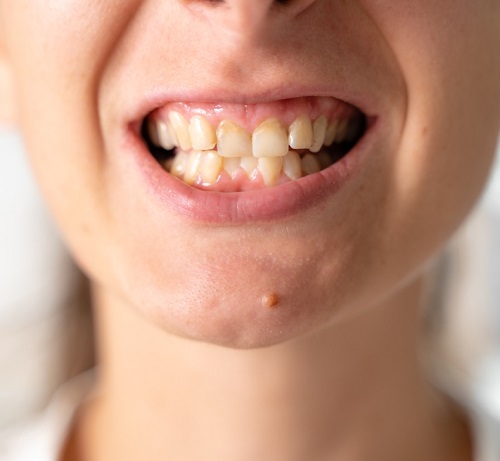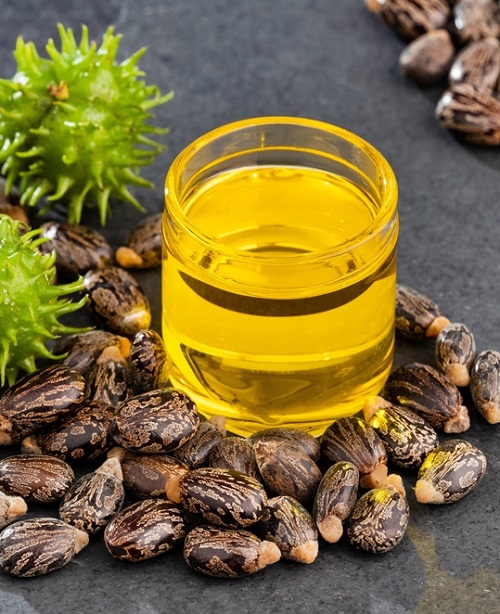Kick out your shyness and enhance your beauty with your charming and wide smile by using castor oil for teeth whitening!
It is a well-known fact that one’s radiating smiles amplify one’s persona. Then why shouldn’t you give a shot to a natural way to make your smile brighter and happier? Say goodbye to chemical-laden products and grab a radiant grin with castor oil for teeth whitening.
What Leads to Teeth Discoloration?

Teeth discoloration can be a result of various factors, including:
- Regular consumption of coffee, tea, and red wine can stain your teeth. These drinks are rich in chromogens, pigment-heavy compounds that cling to tooth enamel, leading to visible surface stains.
- Both smoking and chewing tobacco introduce tar and nicotine to your teeth. These substances not only stain your teeth but also weaken the enamel, making your teeth more prone to discoloration.
- Neglecting regular brushing and flossing allows plaque and tartar to accumulate on your teeth. Over time, this buildup can lead to the yellowing or darkening of your teeth.
- As you age, the outer enamel layer of your teeth naturally thins, exposing the yellowish dentin beneath. This effect can be exacerbated by your diet, lifestyle habits, and genetic factors.
- Medications, especially tetracycline antibiotics, can cause deep, intrinsic stains if taken during tooth development. Excessive fluoride intake during childhood may also result in a condition called fluorosis, which discolors teeth from within.
- Injuries to the teeth can cause them to darken or develop spots. This is a protective response, where the teeth produce more dentin—a naturally yellowish material—in response to trauma.
- Some people have naturally thicker or more porous enamel, making their teeth more vulnerable to stains and discoloration.
- Older dental restorations, like amalgam fillings, can darken over time, affecting the surrounding tooth’s color and overall appearance.
- Consuming excessive amounts of sugary and acidic foods can also lead to tooth discoloration, as these foods contribute to enamel erosion.
Does Castor Oil For Whiten Teeth?

Castor oil undoubtedly promotes oral health and can be a boon for your teeth and gums. However, its role in teeth whitening is more than what meets the eye. While it might help keep your mouth healthy and potentially reduce plaque buildup—which indirectly could affect teeth staining—castor oil doesn’t actually have any properties that bleach the teeth.
If you’re serious about getting a whiter smile, the best step is to consult with a dentist. They can recommend proven, safe methods and products for effective teeth whitening, ensuring you get the results you want without risking your oral health.
Potential Benefits of Castor Oil for Teeth Whitening

While castor oil can’t ‘whiten’ your teeth, it certainly does possess some benefits:
1. Shows Antimicrobial Properties
Abundant in ricinoleic acid, castor oil is a powerhouse in fighting microbes. This property helps it significantly reduce the bacteria in your mouth, tackling plaque before it starts. Since plaque leads to tooth discoloration, keeping it at bay with castor oil can help your teeth retain their natural whiteness.
2. Reduces Inflammation
Thanks to its anti-inflammatory effects, castor oil can calm inflamed gums, which often contribute to a less vibrant smile.
By boosting gum health, castor oil not only supports a healthier mouth but also enhances the visual appeal of your smile, creating a fresher, more vibrant look.
3. Removes Stains
Castor oil isn’t a bleaching agent, but when used in oil pulling, it plays a role in mechanically scrubbing away surface stains and debris.
This process is more subtle than chemical whitening treatments, yet it effectively contributes to a gradual enhancement of your teeth’s appearance, helping to stave off new stains and maintain a cleaner smile.
How to Use Castor Oil For Teeth Whitening?
Oil pulling is the best option to eliminate those ugly stains using castor oil. Here’s how you can do it:
- Begin with pure, high-quality castor oil that’s safe for oral use. This ensures you avoid any unwanted additives.
- Perform oil pulling first thing in the morning before eating or drinking to maximize effectiveness against overnight bacteria buildup.
- Use about a tablespoon of castor oil. This is enough to coat the inside of your mouth without overwhelming you.
- Swish the oil around your mouth slowly, making sure it moves through your teeth and along your gums. Keep it gentle to avoid jaw soreness.
- Continue this process for 15 to 20 minutes to allow the oil to thoroughly bind with the bacteria and plaque, effectively drawing them out.
- When you’re finished, spit the oil into a trash bin rather than the sink to prevent plumbing issues. Remember, it now contains toxins and bacteria, so don’t swallow it.
- Afterward, rinse your mouth with warm water and brush your teeth as usual to remove any residue and ensure your mouth is fully clean.
- For the best results, make oil pulling a regular part of your morning routine. The benefits increase with regular use.
As you continue to use castor oil for teeth whitening, pay attention to any changes in the color of your teeth. Keep track of your progress over time to see how effective the treatment is for you.
Things To Count On
- Check for any allergic reactions by doing a patch test on your skin before using castor oil in your mouth.
- Make sure you’re using good quality castor oil, preferably organic and cold-pressed.
- Use only a small amount of castor oil to prevent accidental ingestion.
- Avoid swallowing castor oil while using it for teeth whitening, as it may cause gastrointestinal discomfort.
- Be cautious if you have sensitive gums, as castor oil may cause irritation or discomfort.
- Consult with your dentist before starting any new oral care regimen, especially if you have existing dental issues or medical conditions.
- Use it a couple of times a week, not too often but not too rarely either.
- Discontinue use if you experience any adverse reactions or discomfort and seek medical advice if needed.

